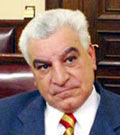Zahi Hawass is an Egyptian Egyptologist and archaeologist who obtained a Bac helor's degree from Alexandria University, and his Doctoral Degree (Ph.D) from the University of Pennsylvania. He is currently the Secretary General of the Egyptian Supreme Council of Antiquities; prior to that, he was the Director of the Giza Plateau and has also worked at archaeological sites in the Nile Delta, the Western Desert, and the Upper Nile Valley.
helor's degree from Alexandria University, and his Doctoral Degree (Ph.D) from the University of Pennsylvania. He is currently the Secretary General of the Egyptian Supreme Council of Antiquities; prior to that, he was the Director of the Giza Plateau and has also worked at archaeological sites in the Nile Delta, the Western Desert, and the Upper Nile Valley.
Hawass is currently spearheading a movement to return many prominent Ancient Egyptian artifacts, such as the Rosetta Stone, the bust of Nefertiti, the zodiac ceiling painting from the Dendera Temple, the bust of Ankhhaf (the architect of the Chephren Pyramid), and the statue of Hemiunu, nephew of the Pharaoh Khufu, builder of the largest pyramid, to Egypt from collections in various other countries.
In July 2003, the Egyptians demanded the return of the Rosetta Stone. Hawass, as secretary general of the Supreme Council of Antiquities in Cairo, told the press, "If the British want to be remembered, if they want to restore their reputation, they should volunteer to return the Rosetta Stone because it is the icon of our Egyptian identity."
He is also a vocal opponent of the ancient astronauts theories about a previous worldwide civilization. He appeared on a History Channel show to dispel the theories, and provided evidence to show that the Egyptians built the pyramids of Egypt. Hawass is now a regular columnist for Egypt Today magazine.
Hawass was also alongside the Egyptologist Otto Schaden who opened Tomb KV63 in February 2006 — the first intact tomb to be found in the Valley of the Kings since 1922.
In June 2007, Hawass announced that he and a team of experts may have identified the mummy of Hatshepsut in KV60, a small tomb in the Valley of the Kings.
Dr Hawass was recently in the UK for the opening of the "Tutankhamen and the Golden Age of the Pharaohs" exhibition in London.
He is the author of many books including one on "King Tutankhamen: The Treasures from the Tomb" published to coincide with this major exhibition in the UK.
His most recent article on Tutankhamen was published in Ancient Egypt magazine.
He has written several articles for this bi-monthly UK-based magazine on ancient Egypt.
He is opposed to the claims of Afrocentrists. According to Dr. Hawass "Tutankhamen was not black, and the portrayal of ancient Egyptian civilization as black has no element of truth to it."
 helor's degree from Alexandria University, and his Doctoral Degree (Ph.D) from the University of Pennsylvania. He is currently the Secretary General of the Egyptian Supreme Council of Antiquities; prior to that, he was the Director of the Giza Plateau and has also worked at archaeological sites in the Nile Delta, the Western Desert, and the Upper Nile Valley.
helor's degree from Alexandria University, and his Doctoral Degree (Ph.D) from the University of Pennsylvania. He is currently the Secretary General of the Egyptian Supreme Council of Antiquities; prior to that, he was the Director of the Giza Plateau and has also worked at archaeological sites in the Nile Delta, the Western Desert, and the Upper Nile Valley.Hawass is currently spearheading a movement to return many prominent Ancient Egyptian artifacts, such as the Rosetta Stone, the bust of Nefertiti, the zodiac ceiling painting from the Dendera Temple, the bust of Ankhhaf (the architect of the Chephren Pyramid), and the statue of Hemiunu, nephew of the Pharaoh Khufu, builder of the largest pyramid, to Egypt from collections in various other countries.
In July 2003, the Egyptians demanded the return of the Rosetta Stone. Hawass, as secretary general of the Supreme Council of Antiquities in Cairo, told the press, "If the British want to be remembered, if they want to restore their reputation, they should volunteer to return the Rosetta Stone because it is the icon of our Egyptian identity."
He is also a vocal opponent of the ancient astronauts theories about a previous worldwide civilization. He appeared on a History Channel show to dispel the theories, and provided evidence to show that the Egyptians built the pyramids of Egypt. Hawass is now a regular columnist for Egypt Today magazine.
Hawass was also alongside the Egyptologist Otto Schaden who opened Tomb KV63 in February 2006 — the first intact tomb to be found in the Valley of the Kings since 1922.
In June 2007, Hawass announced that he and a team of experts may have identified the mummy of Hatshepsut in KV60, a small tomb in the Valley of the Kings.
Dr Hawass was recently in the UK for the opening of the "Tutankhamen and the Golden Age of the Pharaohs" exhibition in London.
He is the author of many books including one on "King Tutankhamen: The Treasures from the Tomb" published to coincide with this major exhibition in the UK.
His most recent article on Tutankhamen was published in Ancient Egypt magazine.
He has written several articles for this bi-monthly UK-based magazine on ancient Egypt.
He is opposed to the claims of Afrocentrists. According to Dr. Hawass "Tutankhamen was not black, and the portrayal of ancient Egyptian civilization as black has no element of truth to it."


